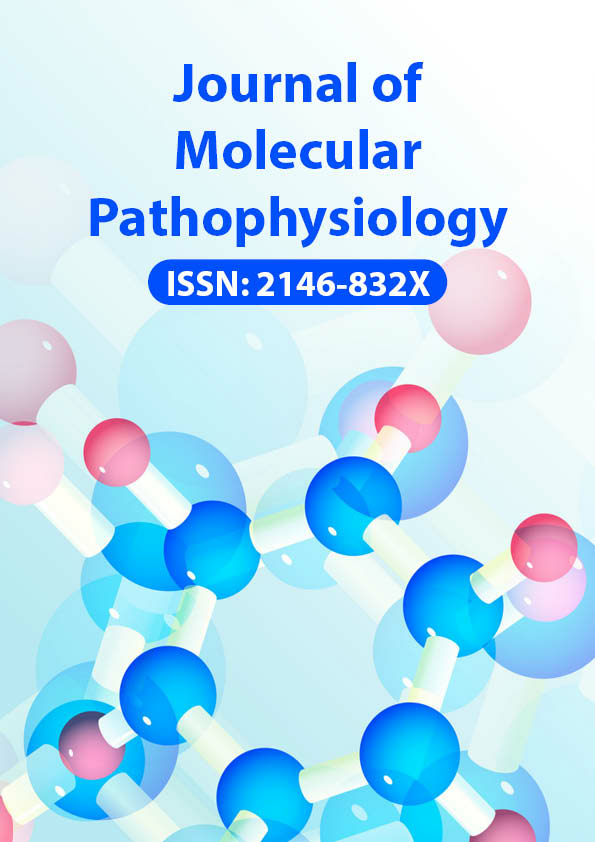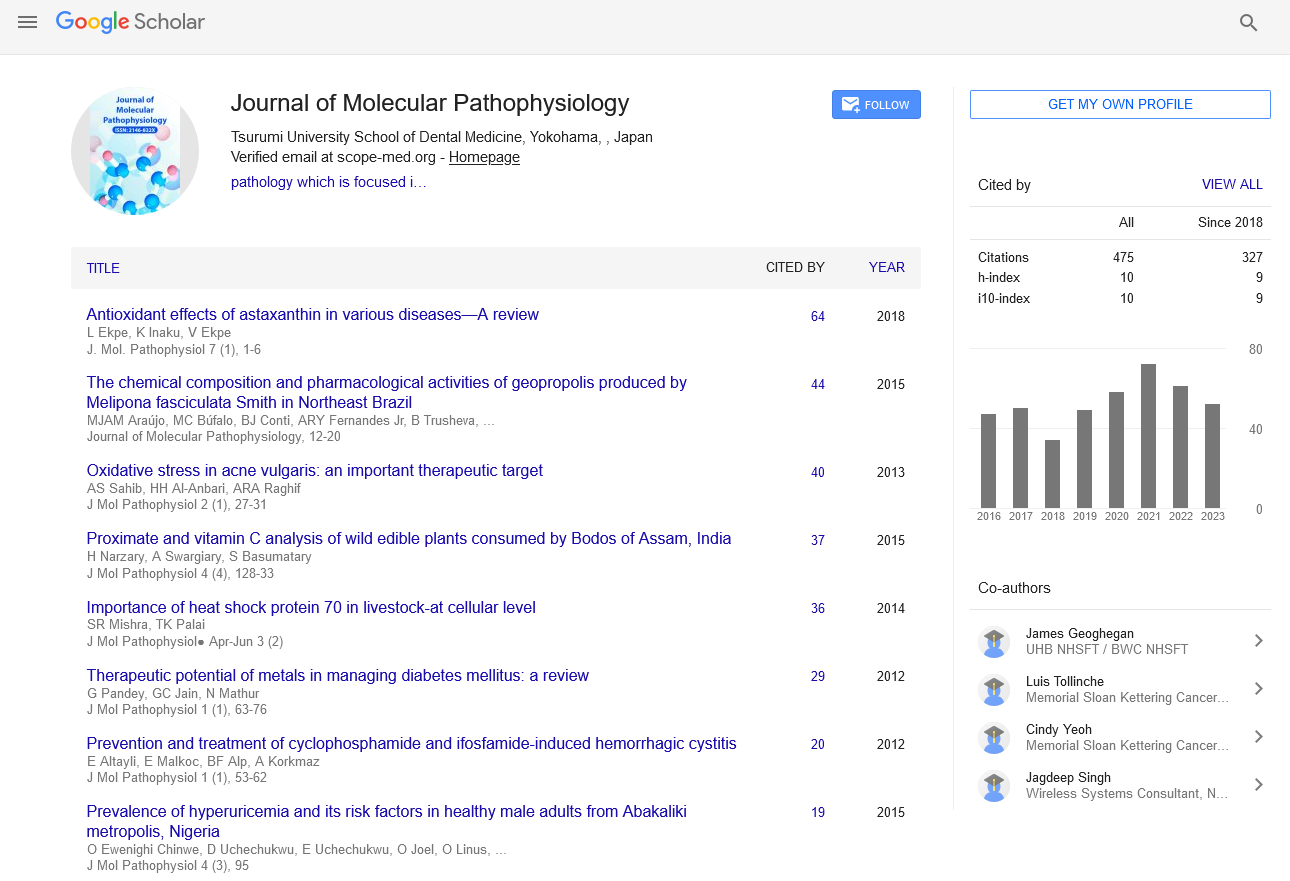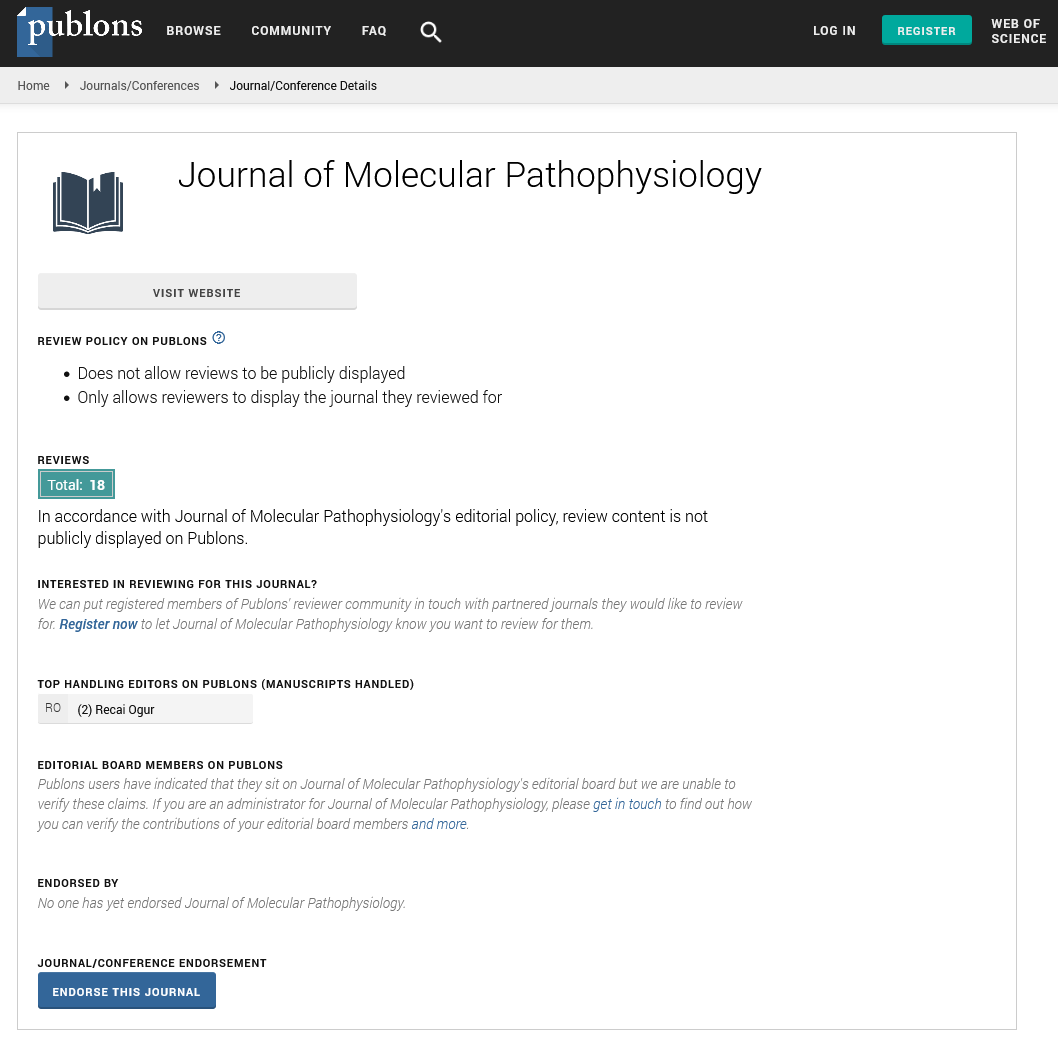Short Communication - Journal of Molecular Pathophysiology (2024)
Pathophysiology of Inherited Metabolic Disorders: Enzymatic Defects and their Impact on Cellular Metabolism
Mark Rogers*Mark Rogers, Department of Pathology, University of Zurich, Zurich, Switzerland, Email: rogersm88@yahoo.com
Received: 21-Jun-2024, Manuscript No. JMOLPAT-24-144392; Editor assigned: 24-Jun-2024, Pre QC No. JMOLPAT-24-144392 (PQ); Reviewed: 09-Jul-2024, QC No. JMOLPAT-24-144392; Revised: 16-Jul-2024, Manuscript No. JMOLPAT-24-144392 (R); Published: 23-Jul-2024
About the Study
Inherited metabolic disorders are a group of genetic conditions that result from defects in specific enzymes or transport proteins, disrupting normal metabolic processes. These disorders are often due to singlegene mutations that lead to the accumulation or deficiency of substrates, intermediates, or products in metabolic pathways. The resultant biochemical imbalances can affect various tissues and organs, leading to a wide range of clinical manifestations [1]. Inherited metabolic disorders typically involve mutations in genes encoding enzymes responsible for the metabolism of carbohydrates, proteins, fats, or other essential biomolecules. When a particular enzyme is deficient or non-functional, the metabolic pathway it controls is disrupted. This can result in the accumulation of toxic substances or a deficiency in essential products, both of which can have detrimental effects on cellular function and overall health [2]. One of the primary ways these disorders happen through the accumulation of toxic metabolites. For instance, in Phenylketonuria (PKU), a deficiency in the enzyme phenylalanine hydroxylase leads to the buildup of phenylalanine. High levels of phenylalanine can be neurotoxic, leading to intellectual disability, seizures, and behavioral problems if not managed through dietary restrictions. Similarly, in Maple Syrup Urine Disease (MSUD), defects in the enzymes responsible for breaking down branched-chain amino acids cause these amino acids and their toxic by-products to accumulate, resulting in severe neurological damage and potentially life-threatening metabolic crises [3].
Inherited metabolic disorders can also cause disease through the deficiency of vital compounds. For example, in glycogen storage diseases, mutations in enzymes involved in glycogen metabolism result in inadequate glucose production during fasting states.
This can lead to hypoglycemia, muscle weakness, and organ dysfunction [4]. In other cases, such as in certain types of mucopolysaccharidoses, the inability to degrade glycosaminoglycans leads to their accumulation within lysosomes, causing cellular and tissue damage that appears as delays in development, organomegaly, and skeletal abnormalities [5]. The clinical presentation of inherited metabolic disorders is often complex and can vary widely, even among individuals with the same genetic mutation. Newborns may appear normal at birth, but symptoms often develop as metabolic demands increase with feeding or illness [6]. In some cases, symptoms may be worsening by fasting, stress, or other environmental factors that exacerbate the underlying metabolic defect. Early signs can include poor feeding, vomiting, lethargy, and failure to thrive. As the disorder progresses, more specific symptoms related to the affected metabolic pathway become apparent, such as developmental delays, neurological impairments, hepatomegaly, cardiomyopathy, or renal dysfunction [7].
Diagnosis of inherited metabolic disorders typically involves a combination of clinical evaluation, biochemical testing, and genetic analysis. Biochemical tests can detect abnormal levels of metabolites in blood, urine, or other body fluids, providing clues to the specific metabolic pathway affected. Enzyme assays can directly measure the activity of possible insufficiency of enzymes. Genetic testing can identify mutations in the genes encoding these enzymes, confirming the diagnosis and allowing for carrier testing and prenatal diagnosis in affected families [8]. Management of inherited metabolic disorders often requires a multidisciplinary approach, including dietary modifications, pharmacological interventions, and supportive therapies. Dietary management is an important treatment for many of these disorders [9]. For example, individuals with PKU must follow a low-phenylalanine diet to prevent the buildup of phenylalanine and its toxic effects. In other disorders, such as Medium-Chain Acyl-Coa Dehydrogenase Deficiency (MCADD), avoiding fasting and consuming frequent, carbohydrate-rich meals can help maintain metabolic stability. Some inherited metabolic disorders respond to specific medications that either replace the deficient enzyme or modify the metabolic pathway to reduce the accumulation of toxic metabolites [10]. For example, Enzyme Replacement Therapy (ERT) has been successful in treating certain lysosomal storage disorders, such as gaucher disease and fabry disease, by providing the missing enzyme to break down accumulated substrates. Additionally, some disorders may benefit from cofactor supplementation, which can enhance residual enzyme activity.
References
- Leon‐Del‐Rio A. Biotin in metabolism, gene expression, and human disease. J Inherit Metab Dis. 2019;42(4):647-654.
- Barile M, Giancaspero TA, Leone P, Galluccio M, Indiveri C. Riboflavin transport and metabolism in humans. Journal of inherited metabolic disease. 2016;39(4):545-557.
- Tolomeo M, Nisco A, Leone P, Barile M. Development of novel experimental models to study flavoproteome alterations in human neuromuscular diseases: The effect of Rf therapy. Int J Mol Sci. 2020;21(15):5310.
- MacDonald A, Van Rijn M, Feillet F, Lund AM, Bernstein L, Bosch AM, et al. Adherence issues in inherited metabolic disorders treated by low natural protein diets. Ann Nutr Metab. 2012;61(4):289-295.
- Singh RH. Nutritional management of patients with urea cycle disorders. J Inherit Metab Dis. 2007;30(6):880-887.
- Forny P, Horster F, Ballhausen D, Chakrapani A, Chapman KA, Dionisi‐Vici C, et al. Guidelines for the diagnosis and management of methylmalonic acidaemia and propionic acidaemia: First revision. J Inherit Metab Dis. 2021;44(3):566-592.
- Haberle J, Burlina A, Chakrapani A, Dixon M, Karall D, Lindner M, eta l. Suggested guidelines for the diagnosis and management of urea cycle disorders: First revision. J Inherit Metab Dis. 2019;42(6):1192-1230.
- Merritt JL, MacLeod E, Jurecka A, Hainline B. Clinical manifestations and management of fatty acid oxidation disorders. Rev Endocr Metab Disord. 2020;21(4):479-493.
- LeBlanc JG, Milani C, De Giori GS, Sesma F, Van Sinderen D, Ventura M. Bacteria as vitamin suppliers to their host: A gut microbiota perspective. Curr Opin Biotechnol. 2013;24(2):160-168.
- Welling L, Bernstein LE, Berry GT, Burlina AB, Eyskens F, Gautschi M, et al. International clinical guideline for the management of classical galactosemia: Diagnosis, treatment, and follow-up. J Inherit Metab Dis. 2017;40(2):171-176.







